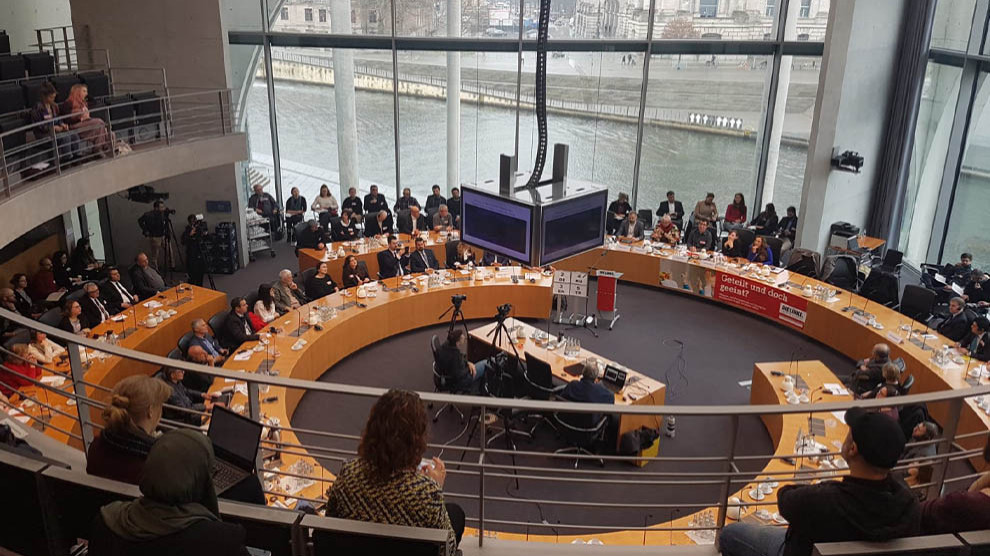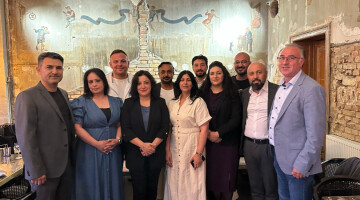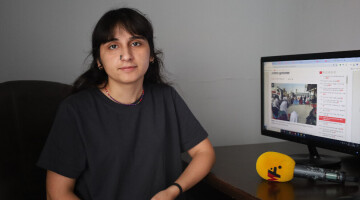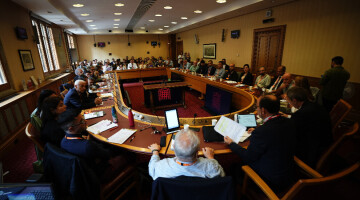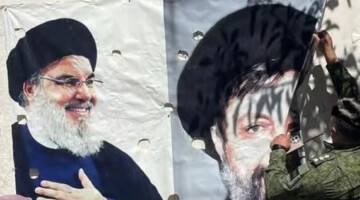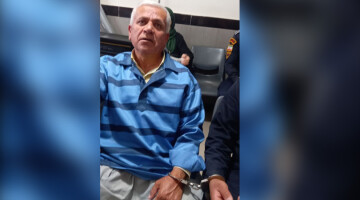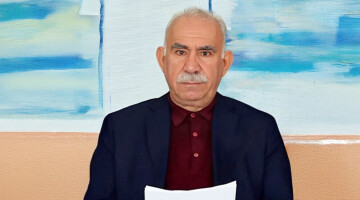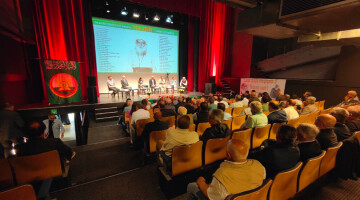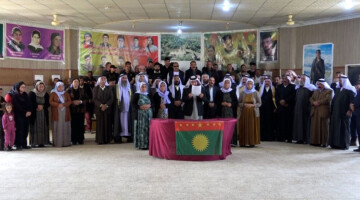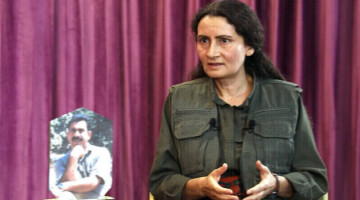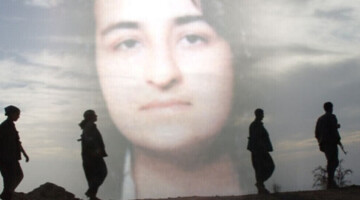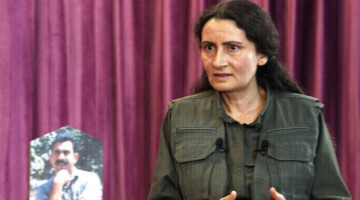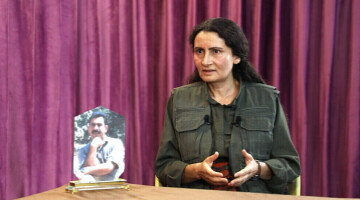Under the title "Divided yet united? - Chances and Perspectives for the Solution of the "Kurdish Question" in the Middle East" a conference organised by the parliamentary group DIE LINKE and the Rosa Luxemburg Foundation (RLS) took place in the German Parliament (Bundestag). The impetus for this meeting came from the still unresolved Kurdish question, which includes the four important Middle Eastern states of Iran, Turkey, Syria and Iraq, as well as the antagonistic interests of the various Kurdish movements.
The four centralist states of Turkey, Iran, Iraq and Syria are the result of Western distribution struggles and arbitrary border demarcation in the imperial interest. The Kurdish people, one of the oldest and third in number in the Middle East, have been a minority without rights and recognition in these states for decades. Several Kurdish popular uprisings have been bloodily crushed.
Resolution of the Kurdish question key element for democratisation of the Middle East
The Kurdish people have repeatedly reacted to the state's policy of oppression and produced various forms and actors of non-violent and armed resistance. While the goal of a separate nation state was pursued for a long time, today the aim is to realize the Kurdish people’s right to self-determination also within the territorial unity of the four central states. In the meantime, the Kurdish question and the Kurdish people’s struggle for self-determination has also taken on the function of a key element for the democratic reorganization and stabilization of the entire region.
With the aim of offering various Kurdish movements and experts a forum from which impulses for a common political-diplomatic solution of the Kurdish question can be generated, numerous personalities discussed on Friday the background of the conflict and sought answers to questions such as how the Kurdish question can be solved, what different approaches there are, what role the involved powers play and where German Kurdish policy is heading.
The opening speech was held by Helin Evrim Sommer, Member of Parliament and spokesperson for development policy of the left-wing parliamentary group, on whose initiative the conference was organised. After a short speech by RLS Deputy Director Gabriele Kickut, messages were delivered to the conference by the renowned human rights lawyer Eren Keskin and peace activist Ela Gandhi.
Ismail Küpeli: The real problem is the nation states
Afterwards, political scientist and historian Ismail Küpeli delivered a lecture entitled "How it all began: Causes and Backgrounds of the Kurdish Question in the Middle East". Political scientist and historian Ismail Küpeli provided a historical classification of the Kurdish question. With an excursus on the emergence of the problem towards the end of the First World War, Küpeli made it clear that the conflict is part of the chaotic process of the formation of nation states in the Middle East. Küpeli summarized in a short time window the events in Turkey as well as the history of the Kurds from 1920 until today and showed that within a short time the Kurds' right to exist has been rescinded in favour of a policy that gave free rein to the interests of the centralist states Turkey, Iran, Iraq and Syria. The historian connected the current developments affecting the Kurds with the consequences of the nation-state system that the European victorious powers built at that time from the ruins of the Ottoman multi-ethnic empire and spoke out against the definition of a "Kurdish question" or "problem". The problem, he said, was rather the nation states depriving the Kurds of their rights.
Claudia Roth: Only weapons to the Kurds are not enough
In a subsequent round of discussions with Green politician Claudia Roth and the foreign policy spokesperson of the Left Party, Stefan Liebich, the focus was on German "Kurdish policy" and the Federal Republic's arms exports. Roth drew attention to the Turkish state's policy of denial towards the Kurdish people and pointed out the need to recognise all democratic, political and cultural rights of the Kurds. Regarding the developments in Southern Kurdistan, Roth criticized that the German government had not sufficiently supported the democratic process after Saddam Hussein. She said that it was not enough just to supply weapons to the region. Instead, democratic structures should be supported to consolidate democracy in the autonomous region of Kurdistan within a strong and federal Iraq. The Green politician stressed that Turkey was violating international law in Northern and Eastern Syria and called for an end to arms exports to the regime in Ankara. In addition, Roth warned that the EU-Turkey agreement made Europe susceptible to blackmail and at the expense of refugees.
Stefan Liebich: Change of perspective with regard to Kurds
Left-wing politician Stefan Liebich called for a change of perspective in Germany regarding the Kurds, which should include the lifting of the ban on the PKK and symbolism of the Kurdish liberation movement, and a new discourse in dealing with relations with Turkey. "A state that conducts wars of aggression contrary to international law must no longer receive German weapons, even if it is a NATO partner," said Liebich, criticizing the contradictory Kurdish policy of the German government. He noted that all parties had agreed that the Turkish state was breaking international law in Afrin, but Germany had not shown a clear position, he added. Liebich also said that the ISIS was not the problem of the Kurds alone, but had to be fought together against as a global problem.
Hemin Hawrami: Independence of Kurdistan is the primary goal of the KDP
After a break, another discussion followed under the title "Between Failed Independence and Regional Autonomy of Kurdistan/Northern Iraq", in which the Vice President of the South Kurdistan Regional Parliament Hemin Hawrami (KDP) and Volker Perthes, Director of the Foundation for Science and Politics, participated. The round table brought to mind the ideological differences between the Kurdish movements from Northern Kurdistan (Turkey) to Rojava/Northern Syria and in Southern Kurdistan (Northern Iraq). The KDP sees the solution of the problem in a Kurdish nation state, said Hawrami and continued: "The KDP continues to strive for Kurdistan's independence despite the failed independence referendum".
Perthes responded to this, saying: "From today's perspective, I advise to extend the regional autonomy of Iraqi Kurdistan. Iraq also needs the Kurds as a factor of stability".
Anita Starosta: Countries of origin should bring back ISIS members
The highlight of the conference was the speech by Ilham Ehmed, the co-chair of the Syrian Democratic Council (MSD). Anita Starosta, consultant for Turkey, Syria and Iraq at the human rights organisation Medico International, among others, also took part in the discussion round "Between threatened self-government in North-East Syria and the restoration of the Assad regime". Starosta, who recently returned from northern Syria, reported on the current situation in Rojava, in particular on the humanitarian situation and the consequences of the attacks of the Turkish occupying forces and their jihadist allies. The historian sharply criticized the fact that the North-East Syrian autonomous administration is left on its own due to a lack of international support to provide 12,000 women and children of the ISIS with international citizenship and called on the countries of origin to take them back. "There are one million internally displaced persons in Northeast Syria and more are arriving from Idlib. But the United Nations insists that aid money should only be paid to the Syrian government, which does not pass it on to the Kurdish autonomous administration," Starosta continued.
Ilham Ehmed: We want democratic autonomy within Syria
Ilham Ehmed explained that the Kurdish question did not only include oppression and exploitation as well as uprisings and conflicts in Turkey, Iran and Iraq. "In Syria, too, the Kurds were violently oppressed," said the politician, recalling the Assad regime's assimilation policy, which continues. Ehmed addressed recent statements by Bashar al-Assad that a Kurdish question does not exist in Syria and said: "These statements once again make it clear that the attitude towards the Kurds has remained the same and the regime continues to accuse us of separatism.” According to Ehmed, this attitude would only lead to a further worsening of the Syrian crisis and would not differ from the mentality that blessed the Turkish occupation of the northern Syrian cities of Girê Spî (Tal Abyad) and Serêkaniyê (Ras al-Ain). The Kurds do not want a division of Syria, they want democratic autonomy within the Syrian state, Ehmed underlined.
The autonomous administration should be recognized
The MSD Chairwoman underlined that the Kurds in Syria have made a unique attempt in recent years to establish a democratic alternative in the midst of a brutal war. She recalled Rojava's losses in the fight against the ISIS. Ehmed said that the defense of common human values and a free world cost the region more than 11,000 dead and more than 22,000 wounded and pointed out that the ISIS was re-forming. "The ISIS children in the refugee camps are now 5 years old, but soon they will be 10, 15 years old and constitute a new generation of ISIS."
Women who rebel against the ISIS ideology in the camps run for ISIS members in northern Syria must be rehabilitated, Ehmed demanded and added; “Others who cling to the idea of a caliphate must be tried and convicted. This will require a court in Rojava. The international community must work together to find a solution."
Ehmed also focused on the Turkish campaign of extermination against the population and nature in the occupied territories of northern Syria. While Assad denies the Kurds their existence, olive trees are being cut down in Afrin and the whole world is watching, Ehmed said. “The time to recognize the autonomous administration of northern and eastern Syria has long since arrived. However, we are faced with a situation that is the opposite. For an early solution to the crisis, the autonomous administration must be involved in the political negotiations," the politician demanded.
Does Germany want a radical Islamist Turkey or a democratic one?
Ehmed expressed positively about the efforts of different Kurdish parties and movements to build Kurdish national unity. She expressed her hope that corresponding practical steps will be developed soon and said she believed Germany could contribute to the solution of the Kurdish question, even if this would require courage. The politician urged the German government to consider whether it would be on the safe side with a radical Islamist Turkish state or with a democratized Turkey. Ehmed described Berlin's plans to make financial aid available to Turkey for the construction of refugee accommodation in northern Syria as a breach of taboo, pointing out that around 80 per cent of the Turkish-occupied areas in the region had already been demographically altered in favour of Ankara. “Should the German government actually provide Turkey with funds to build refugee shelters in the occupation zone, it should know that jihadists, not refugees, will be settled there. This will mean that the Federal Republic will be financially involved in the ethnic expulsion of the ancestral population,” she added.
Mithat Sancar: Opening Europe's doors to refugees
The conference ended with a discussion on "Erdogan's Turkey between repression and the struggle for democracy" with HDP co-chair Mithat Sancar, CHP MP Sezgin Tanrikulu and Dilek Kurban of Berlin's Hertie School.
Sancar stressed that there can be no successful democratisation process in Turkey as long as the Kurdish question remains unresolved. He said that the HDP would continue to work for a democratic Turkey. Sancar also welcomed the aspirations for Kurdish unity and suggested common mechanisms of the different Kurdish movements to strengthen the relationship between the movements. The HDP would continue to support all activities for Kurdish national unity, he said.
Regarding the refugee deal between Turkey and the EU, Sancar said that it was open to criticism in many respects and made Europe open to blackmail.
Sancar said; “When we warned the German government while the refugee deal was made, they defended themselves saying right-wing extremist and populist movements would grow stronger unless the refugee influx stopped. We responded that they would, on the contrary, lead to an intensification of the war and to a high influx of refugees with their support. What we have experienced since has proved us to be right. Europe should open its gates and provide refugees and migrants with conditions to live in dignity. We want to preserve our humanity. Therefore we must prevent refugees from becoming bargaining chips for blackmail."

